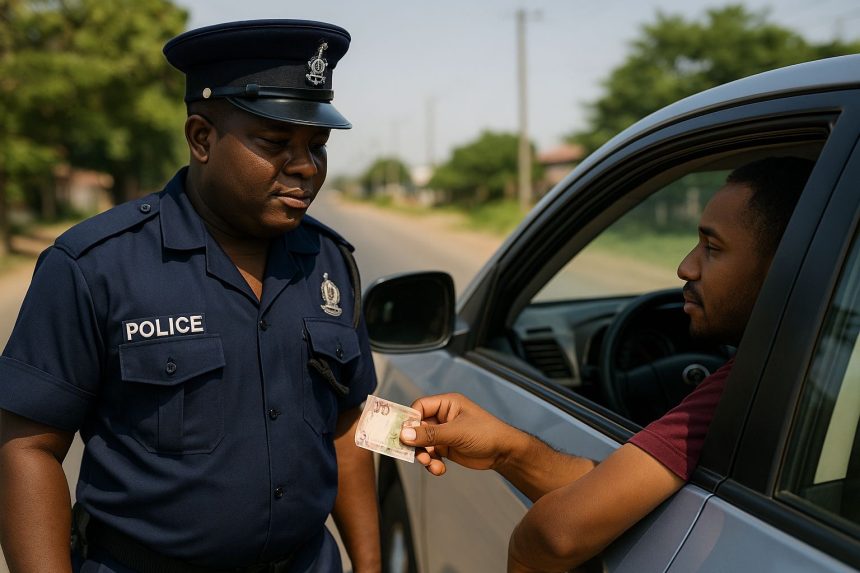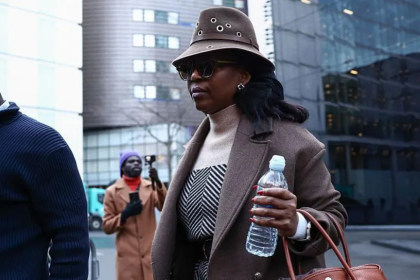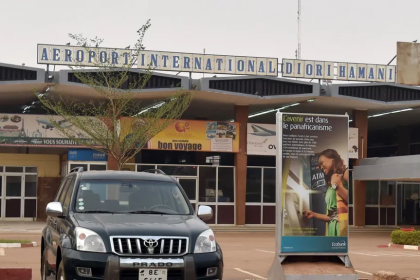A new Ghana Statistical Service study has done the impossible: it has taken one of the most obvious facts of Ghanaian life and wrapped it in charts, graphs and national data. The result? Police officers, especially the legendary Motor Traffic and Transport Department (MTTD), remain the undisputed heavyweight champions of collecting “something small.
According to the report, which surveyed more than 7,000 adults across the country, nearly one in six Ghanaians who interacted with a public official last year admitted handing over “a gift.”
In true Ghanaian fashion, the word “gift” covered everything from a folded GHC10 note to a “very small something” slipped across a car window at a checkpoint.
If bribery were an Olympic sport, the Police MTTD would be walking away with medals in every category and probably stopping drivers on the way home to “check their licence.”
The GSS numbers are merciless. An astonishing 61 percent of people who dealt with the MTTD confessed to paying a bribe.
Another 46.7 percent said officers from the General Duties Division also “requested encouragement” before performing their duties.
Even the Criminal Investigations Department made the honours list, proving that nothing (not even crime fighting) is safe from the scent of a little envelope.
Citizens described these transactions with the usual linguistic creativity: some said the officer needed “water,” others said he wanted “koko and koose.” One respondent claimed the policeman told him, “Boss, my shift is long. Boost me.”
The survey didn’t just stop at counting envelopes. It examined who pays these gifts, how much, and why.
Men paid the majority of bribes, which the GSS tactfully did not attribute to reckless driving but which most women reading the report immediately understood.
Urban residents paid more frequently, probably because they meet more police checkpoints per kilometre than rural residents meet goats.
Cash remains the king of bribes, making up roughly 85 percent of all “tokens of appreciation.” Meanwhile, items like drinks, snacks or “a little something for the boys” trailed far behind, perhaps because carry-forward jollof rice isn’t as easy to pass discreetly through a car window as a crisp GHC20 note.
People with disabilities were found to be among the groups most likely to face demands, proving once again that the bribery economy is equal-opportunity – except when it comes to fairness.
Despite all this, only about 14 percent of those who paid a bribe reported it. GSS analysts say this is because people fear retaliation. Drivers say it’s because reporting a police officer for bribery requires going back to the police.
One respondent summarised the national mood perfectly: “I didn’t report because by the time I reach the station, the same officer will be at the front desk asking if he should ‘process me quickly.’”
The report also digs into the sociological side of bribery, noting that many Ghanaians have normalised these payments as everyday lubrication for public services.
In other words, the problem isn’t just that some officers ask; it’s that many citizens treat the “dash” as part of the service fee.
Government Statistician Professor Samuel Annim has repeatedly warned that this normalisation is dangerous, but the GSS data suggest most Ghanaians are still struggling to separate “gift-giving culture” from “please don’t arrest me.”
Beneath the humour is a serious issue. The police top the bribery rankings not just because of jokes, but because of how often citizens rely on them – for traffic control, licensing checks, reporting crime and obtaining basic documents.
The more contact people have with an institution, the more chances there are for envelopes to change hands.
The report calls for targeted reforms in policing, transport regulation and public education, urging Ghanaians to rethink the idea that every uniform deserves “something small” before it will function.
Still, as long as checkpoints remain, so will the dance between drivers and officers: the cautious roll-down of the window, the polite “Good evening, officer,” the predictable request, the sigh, the subtle exchange, and the resumption of traffic as if it were all part of the Ghana Highway Code.
But at least now, thanks to the Ghana Statistical Service, we have data to prove what motorists have been saying for decades: in the grand marketplace of Ghanaian public life, the police are still the best in the business at spotting a bribe from 200 metres away, even before they claim they smelled alcohol.






